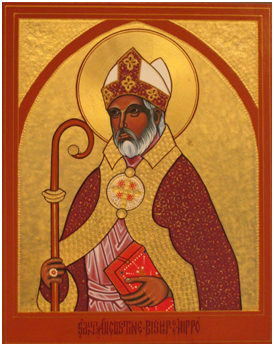A Year with Saint Augustine
 One of the greatest intellectual and spiritual discoveries of my first year of college was the "Confessions" of St. Augustine. We had to read them in my Freshmen Civ class, and the book instantly resonated with me and it made St. Augustine my favorite saint. Profoundly spiritual and holy while remaining eminently human and accessible, he combined the transcendental and imminent in a unique way. As a professor of rhetoric before becoming a bishop of Hippo, he had a special way with words that made many of his phrases into memorable quotes. If I had to choose a favorite one it would probably be 'You have made us for yourself, O Lord, and our hearts are restless until they
find their
rest in you.'
One of the greatest intellectual and spiritual discoveries of my first year of college was the "Confessions" of St. Augustine. We had to read them in my Freshmen Civ class, and the book instantly resonated with me and it made St. Augustine my favorite saint. Profoundly spiritual and holy while remaining eminently human and accessible, he combined the transcendental and imminent in a unique way. As a professor of rhetoric before becoming a bishop of Hippo, he had a special way with words that made many of his phrases into memorable quotes. If I had to choose a favorite one it would probably be 'You have made us for yourself, O Lord, and our hearts are restless until they
find their
rest in you.'
For several years now my thoughts have been very preoccupied with concepts of citizenship and what it means to belong to a particular state. Being a citizen of right country makes a profound impact on your life, probably more than almost any other biographical factor. And yet, we have very little choice in determining which country we would like to be citizens of. In the midst of all that, we Christians are constantly reminded that we are not to look for a permanent dwelling in any particular land or political order. We are all refugees – pilgrims on this earth headed for our ultimate destinations. However, this age to come has its ramifications in the here and now, and we are called to make a difference and already now work for those virtues and qualities that we expect to poses at our final destination.
St. Augustine was living and writing in the years that led to the end of the Roman Empire. That empire placed a very high premium on being a full Roman citizen, as opposed to being just a member of one of many of its incorporated peoples, lands or tribes. The Empire of St. Augustine's time had embraced Christianity, at least officially, but the battle for the hearts and minds of its citizens was far from over. So in the shadows of the crumbling, nominally Christian empire, St. Augustine set out to write his magnum opus, "The City of God." The book is a monumental work of theology. Its aim is to show, based on historical and scriptural evidence, how God's Kingdom is emerging in this world, despite all of the apparent setbacks and contradictions. Many of its sections deal with refutations of the pagan critics of Christianity. Even though none of those criticisms are relevant today, at least not in their original forms, it is enlightening to see how they formed a backdrop and a foil to the early Christian thinking.
So a little over a year ago I ventured out to read "The City of God." The book is almost 1100 pages long in the Penguin edition so it was a long and protracted journey. Eventually I started approaching it in a new way: as a guide to meditation and as a devotional work. I find that with that attitude I was able to make the most out of the experience. And when I finally finished reading it, I longed for more and wished to continue along the same path. Fortunately, St. Augustine was a prolific writer so I am sure that I will be joining him on another trip in a not too distant future.